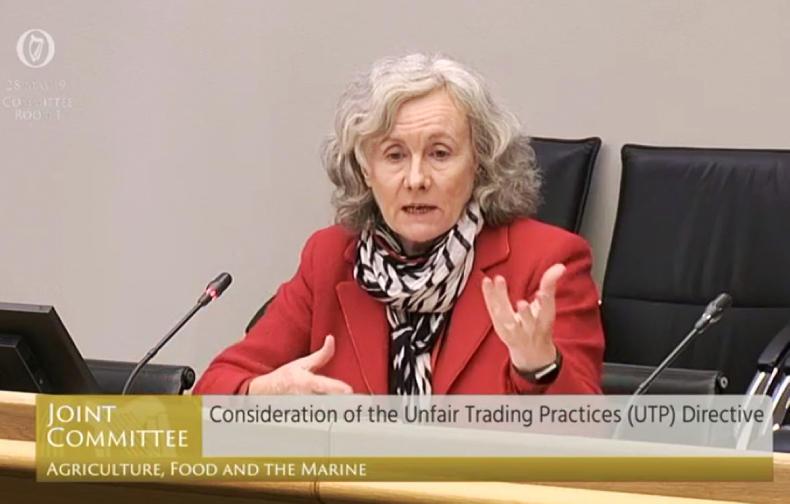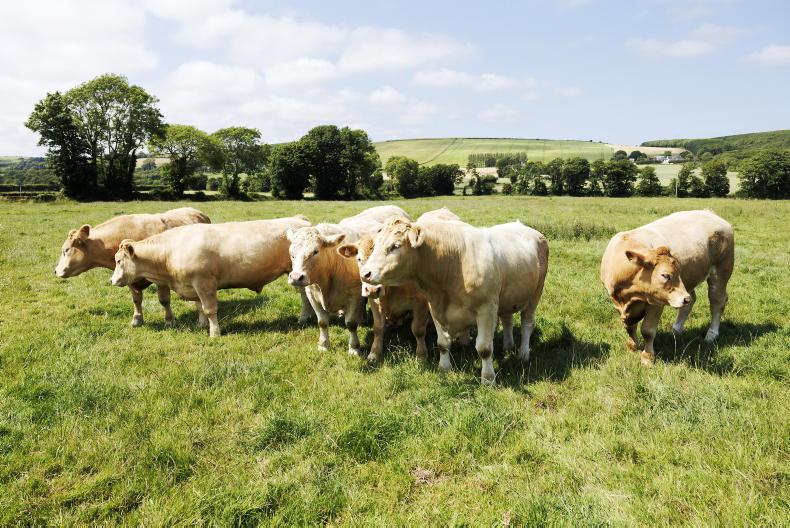A "designated sectoral body is required" to monitor relations between farmers, processors and retailers, the chair of the Consumer and Competition Protection Commission (CCPC) said this Tuesday.
Isolde Goggin told the Oireachtas committee on agriculture that a new EU directive to protect farmers from unfair trading practices will force each country to appoint a "competent authority" in this area. This should not be the CCPC, which is not specialised on agri-food and would not have sufficient resources, she warned.
"If the objective is really to rebalance power, a more substantial and more interventionist approach is required."
Four services
"We believe that farmers in particular want somebody who is on the ground, who’s focused on the farming sector exclusively and who can act quickly on their behalf, including offering some form of adjudication, rather than an enforcement approach that takes place after a breach of the directive has occurred," Goggin said.
She explained that the new regulator should provide four services:
Information gathering, to report what is going on in the industry and what is not transparent.Advice to farmers before they sign a contract. "The retailer is the one with all the lawyers and the corporate staff. They put together a 200-page contract and say, this is where you sign: this is not a negotiation," Goggin said.Mediation and arbitration to intervene in disputes. "We’re not an ombudsman. We take cases to court on behalf of the state to say the law has been broken here," she said on behalf of the CCPC.Enforcement: "At the end of it, you have to have a big stick," Goggin said.This will require an estimated 40 expert staff and a significant budget to oversee the 10,000 businesses covered by the directive, she warned. By comparison, the UK's grocery adjudicator has an annual budget of £2m and regulates only the 22 largest food companies in the country, she added.
Improve the welfare of Irish farmers
On transparency, CCPC member Fergal O'Leary said the directive did not go far enough to clarify how margins were shared between farmers, processors and retailers.
"That’s where we come to the idea of additional measures and an independent regulator," he said.
The suggested regulator would collect market and price data, and intervene in disputes as they arise without farmers having to wait for breaches to be brought to court.
Its role would be "not only to enforce the directive but also to deliver ongoing regulatory interventions to improve the welfare of Irish farmers", Goggin said.
TDs and senators on the committee welcomed the proposal and its chair Pat Deering TD said he would include it in an upcoming report on the future of the beef sector.
A "designated sectoral body is required" to monitor relations between farmers, processors and retailers, the chair of the Consumer and Competition Protection Commission (CCPC) said this Tuesday.
Isolde Goggin told the Oireachtas committee on agriculture that a new EU directive to protect farmers from unfair trading practices will force each country to appoint a "competent authority" in this area. This should not be the CCPC, which is not specialised on agri-food and would not have sufficient resources, she warned.
"If the objective is really to rebalance power, a more substantial and more interventionist approach is required."
Four services
"We believe that farmers in particular want somebody who is on the ground, who’s focused on the farming sector exclusively and who can act quickly on their behalf, including offering some form of adjudication, rather than an enforcement approach that takes place after a breach of the directive has occurred," Goggin said.
She explained that the new regulator should provide four services:
Information gathering, to report what is going on in the industry and what is not transparent.Advice to farmers before they sign a contract. "The retailer is the one with all the lawyers and the corporate staff. They put together a 200-page contract and say, this is where you sign: this is not a negotiation," Goggin said.Mediation and arbitration to intervene in disputes. "We’re not an ombudsman. We take cases to court on behalf of the state to say the law has been broken here," she said on behalf of the CCPC.Enforcement: "At the end of it, you have to have a big stick," Goggin said.This will require an estimated 40 expert staff and a significant budget to oversee the 10,000 businesses covered by the directive, she warned. By comparison, the UK's grocery adjudicator has an annual budget of £2m and regulates only the 22 largest food companies in the country, she added.
Improve the welfare of Irish farmers
On transparency, CCPC member Fergal O'Leary said the directive did not go far enough to clarify how margins were shared between farmers, processors and retailers.
"That’s where we come to the idea of additional measures and an independent regulator," he said.
The suggested regulator would collect market and price data, and intervene in disputes as they arise without farmers having to wait for breaches to be brought to court.
Its role would be "not only to enforce the directive but also to deliver ongoing regulatory interventions to improve the welfare of Irish farmers", Goggin said.
TDs and senators on the committee welcomed the proposal and its chair Pat Deering TD said he would include it in an upcoming report on the future of the beef sector.









SHARING OPTIONS